Bulgarian Church of God Membership 20 Years Ago
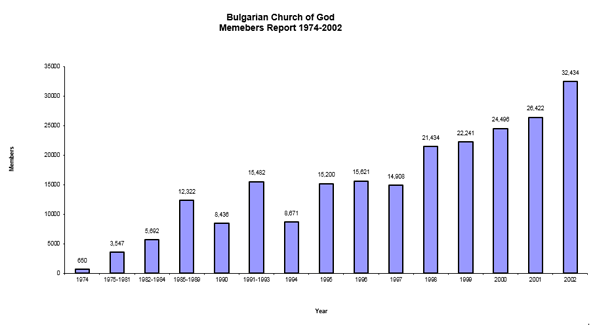
Rewind 20 Years: Services Held
| 1 | 01/02/2002 PM | Central Church of God | Sofia, BG |
| 2 | 01/06/2002 AM | Central Church of God | Sofia, BG |
| 3 | 01/08/2002 PM | Central Church of God | Sofia, BG |
| 4 | 01/09/2002 PM | Central Church of God | Sofia, BG |
| 5 | 01/13/2002 AM | Central Church of God | Sofia, BG |
| 6 | 01/15/2002 PM | Central Church of God | Sofia, BG |
| 7 | 01/16/2002 PM | Central Church of God | Sofia, BG |
| 8 | 01/17/2002 PM | Pravetz Church of God | Pravetz, BG |
| 9 | 01/20/2002 AM | Central Church of God | Sofia, BG |
| 10 | 01/20/2002 PM | Pravetz Church of God | Pravetz, BG |
| 11 | 01/23/2002 PM | Central Church of God | Sofia, BG |
| 12 | 01/24/2002 PM | Pravetz Church of God | Pravetz, BG |
| 13 | 01/25/2002 PM | Bulgarian Evangelical Theological Institute | Sofia, BG |
| 14 | 01/27/2002 PM | Central Church of God | Sofia, BG |
| 15 | 01/29/2002 PM | Central Church of God | Sofia, BG |
| 16 | 01/30/2002 PM | Central Church of God | Sofia, BG |
| 17 | 02/01/2002 PM | Bulgarian Evangelical Theological Institute | Sofia, BG |
| 18 | 02/03/2002 AM | Central Church of God | Sofia, BG |
| 19 | 02/03/2002 PM | Pravetz Church of God | Pravetz, BG |
| 20 | 02/05/2002 PM | Buxton Suburb Home Group | Sofia, BG |
| 21 | 02/06/2002 PM | Central Church of God | Sofia, BG |
| 22 | 02/07/2002 PM | Pravetz Church of God | Pravetz, BG |
| 23 | 02/10/2002 AM | Central Church of God | Sofia, BG |
| 24 | 02/10/2002 PM | Pravetz Church of God | Pravetz, BG |
| 25 | 02/12/2002 PM | Buxton Suburb Home Group | Sofia, BG |
| 26 | 02/13/2002 PM | Central Church of God | Sofia, BG |
| 27 | 02/16/2002 PM | New Central Church of God | Sofia, BG |
| 28 | 02/17/2002 PM | Central Church of God | Sofia, BG |
| 29 | 02/20/2002 PM | Central Church of God | Sofia, BG |
| 30 | 02/21/2002 PM | Pravetz Church of God | Pravetz, BG |
| 31 | 02/24/2002 AM | Central Church of God | Sofia, BG |
| 32 | 02/24/2002 PM | Pravetz Church of God | Pravetz, BG |
| 33 | 02/25/2002 AM | Bulgarian Evangelical Theological Institute | Sofia, BG |
| 34 | 02/25/2002 AM | Bulgarian Evangelical Theological Institute | Sofia, BG |
| 35 | 02/25/2002 AM | Bulgarian Evangelical Theological Institute | Sofia, BG |
| 36 | 02/26/2002 AM | Bulgarian Evangelical Theological Institute | Sofia, BG |
| 37 | 02/26/2002 AM | Bulgarian Evangelical Theological Institute | Sofia, BG |
| 38 | 02/26/2002 AM | Bulgarian Evangelical Theological Institute | Sofia, BG |
| 39 | 02/27/2002 AM | Bulgarian Evangelical Theological Institute | Sofia, BG |
| 40 | 02/27/2002 AM | Bulgarian Evangelical Theological Institute | Sofia, BG |
| 41 | 02/27/2002 AM | Bulgarian Evangelical Theological Institute | Sofia, BG |
| 42 | 02/28/2002 AM | Bulgarian Evangelical Theological Institute | Sofia, BG |
| 43 | 02/28/2002 AM | Bulgarian Evangelical Theological Institute | Sofia, BG |
| 44 | 02/28/2002 AM | Bulgarian Evangelical Theological Institute | Sofia, BG |
| 45 | 02/28/2002 PM | Pravetz Church of God | Pravetz, BG |
| 46 | 03/01/2002 AM | Bulgarian Evangelical Theological Institute | Sofia, BG |
| 47 | 03/01/2002 AM | Bulgarian Evangelical Theological Institute | Sofia, BG |
| 48 | 03/01/2002 AM | Bulgarian Evangelical Theological Institute | Sofia, BG |
| 49 | 03/02/2002 AM | New Central Church of God | Sofia, BG |
| 50 | 03/03/2002 PM | Central Church of God | Sofia, BG |
| 51 | 03/04/2002 AM | Bulgarian Evangelical Theological Institute | Sofia, BG |
| 52 | 03/04/2002 AM | Bulgarian Evangelical Theological Institute | Sofia, BG |
| 53 | 03/05/2002 AM | Bulgarian Evangelical Theological Institute | Sofia, BG |
| 54 | 03/05/2002 AM | Bulgarian Evangelical Theological Institute | Sofia, BG |
| 55 | 03/05/2002 AM | Bulgarian Evangelical Theological Institute | Sofia, BG |
| 56 | 03/06/2002 AM | Bulgarian Evangelical Theological Institute | Sofia, BG |
| 57 | 03/06/2002 AM | Bulgarian Evangelical Theological Institute | Sofia, BG |
| 58 | 03/06/2002 AM | Bulgarian Evangelical Theological Institute | Sofia, BG |
| 59 | 03/06/2002 PM | Central Church of God | Sofia, BG |
| 60 | 03/07/2002 AM | Bulgarian Evangelical Theological Institute | Sofia, BG |
| 61 | 03/07/2002 AM | Bulgarian Evangelical Theological Institute | Sofia, BG |
| 62 | 03/07/2002 AM | Bulgarian Evangelical Theological Institute | Sofia, BG |
| 63 | 03/07/2002 PM | Pravetz Church of God | Pravetz, BG |
| 64 | 03/08/2002 AM | Bulgarian Evangelical Theological Institute | Sofia, BG |
| 65 | 03/08/2002 AM | Bulgarian Evangelical Theological Institute | Sofia, BG |
| 66 | 03/08/2002 AM | Bulgarian Evangelical Theological Institute | Sofia, BG |
| 67 | 03/09/2002 PM | New Central Church of God | Sofia, BG |
| 68 | 03/10/2002 AM | Central Church of God | Sofia, BG |
| 69 | 03/12/2002 AM | Bulgarian Evangelical Theological Institute | Sofia, BG |
| 70 | 03/12/2002 AM | Bulgarian Evangelical Theological Institute | Sofia, BG |
| 71 | 03/12/2002 AM | Bulgarian Evangelical Theological Institute | Sofia, BG |
| 72 | 03/13/2002 AM | Bulgarian Evangelical Theological Institute | Sofia, BG |
| 73 | 03/13/2002 AM | Bulgarian Evangelical Theological Institute | Sofia, BG |
| 74 | 03/13/2002 AM | Bulgarian Evangelical Theological Institute | Sofia, BG |
| 75 | 03/13/2002 PM | Central Church of God | Sofia, BG |
| 76 | 03/14/2002 АM | Bulgarian Evangelical Theological Institute | Sofia, BG |
| 77 | 03/14/2002 АM | Bulgarian Evangelical Theological Institute | Sofia, BG |
| 78 | 03/14/2002 АM | Bulgarian Evangelical Theological Institute | Sofia, BG |
| 79 | 03/14/2002 PM | Pravetz Church of God | Pravetz, BG |
| 80 | 03/15/2002 АM | Bulgarian Evangelical Theological Institute | Sofia, BG |
| 81 | 03/15/2002 АM | Bulgarian Evangelical Theological Institute | Sofia, BG |
| 82 | 03/15/2002 АM | Bulgarian Evangelical Theological Institute | Sofia, BG |
| 83 | 03/16/2002 PM | New Central Church of God | Sofia, BG |
| 84 | 03/17/2002 AM | Central Church of God | Sofia, BG |
| 85 | 03/18/2002 PM | Sugar Factory Church of God | Sofia, BG |
| 86 | 03/20/2002 PM | Central Church of God | Sofia, BG |
| 87 | 03/24/2002 AM | Central Church of God | Sofia, BG |
| 88 | 03/24/2002 PM | Pravetz Church of God | Pravetz, BG |
| 89 | 03/27/2002 PM | Central Church of God | Sofia, BG |
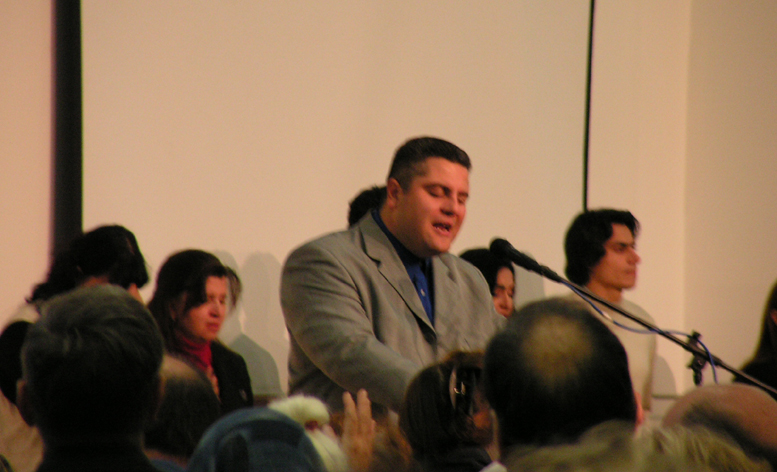
RUSSIA/UKRAINE WAR: ENTER the BIRTH PANGS

Takeaways from our recent message series on Last Minutes of the Last Days: Last Things before the Rapture
Jesus pointed out that in the last days just before his imminent return there shall be terrible times characterized by wars, rumors of wars, famines, pestilences, earthquakes, these are the beginning of more sorrows to come. We’re all witnessing these things NOW in our generation.
The last minutes of the last days are unfolding before our eyes. After two years of pro-pandemic thinking, just in the past few weeks we’ve been introduced with a series of Eschatological Milestones.
WAR on UKRAINE (Pointing toward Israel): ENTER the BIRTH PANGS
WAR
Nuclear instability not at one, not at two, but at three major nuclear plants in Ukraine
https://www.npr.org/2022/03/11/1085427380/ukraine-nuclear-power-plant-zaporizhzhia
U.S. President Biden visiting Eastern Europe only days after Kamala Harris visited there.
Belarus to get involved https://www.reuters.com/world/ukraine-says-russian-aircraft-fired-belarus-ukrainian-air-space-2022-03-11/
Iran attacks American consulate in Iraq AGAIN https://abcnews.go.com/International/wireStory/missiles-target-us-consulate-north-iraq-casualties-83412862
China warns of ‘worst consequences’ for any country that supports Taiwan militarily
https://www.foxnews.com/world/china-worst-consequences-taiwan-military-support-warning
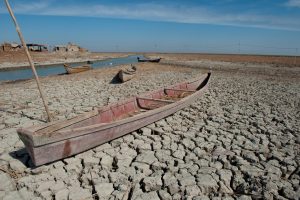
NATURE
Turkey is ready to flood a second channel from the Black Sea to the Mediterranean. Dries up the Euphrates and Tiger rivers (as in Revelation) https://www.youtube.com/watch?v=RxrgKfRIdW0
Earthquakes in Utah (of ALL places in the world)
ECONOMY
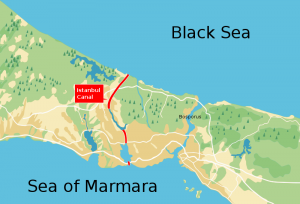
Digital Dollar as last stop before setting the financial system of the Apocalypse
https://www.cnn.com/2022/03/11/tech/us-digital-dollar-cbdc/index.html
Saudi Arabia Considers Accepting Yuan Instead of Dollars for Chinese Oil Sales
BULGARIA
Bulgarian Army now drafting while the Bulgarian government suddenly re-examines our network of bomb shelters long forgotten from the days of the Cold War.
US defense chief’s visit to Bulgaria ‘extremely significant’
Bulgarian ex-Prime Minister and Cabinet members in police custody https://www.novinite.com/articles/214334/Bulgarian+Former+PM+Boyko+Borissov+Spent+the+Night+in+Police+Custody?fbclid=IwAR2Pu1cHhQDhThna3Ye0vajQMHiouZ2v7bx6r7za-5CAgpGkVGZIn6c7Cnk
Brink of NUCLEAR war: Ex-RAF chief warns the world could be only ‘a few steps’ from atomic weapons being used as increasingly desperate Putin struggles to win his war in Ukraine
- Air Marshal Edward Stringer says nuclear war is ‘no longer unthinkable’
- He claims atomic weapons ‘could’ be used as Russia’s invasion continues
- EX-RAF Assistant Chief of Air Staff says it could be ‘only a few steps away’
Need more be said that the time to prepare for Christ’s imminent return is NOW?
“NOW learn a parable of the fig tree: (Israel re-birthed as a nation May 14, 1948) When his branch is yet tender, and puts forth leaves, ye know that summer is nigh: So likewise ye, when ye shall see all these things, know that it is near, even at the doors. Verily I say unto you, THIS GENERATION shall not pass, till ALL these things be fulfilled.” Matt 24:32-34
- It’s been 6,000 years, or 120 jubilees, since the Biblical creation (Gen. 6:3; 2 Pet. 3:8).
- It’s been 70-plus years, the span of a Biblical generation, since the “fig tree,” the Nation of Israel was reestablished and began putting forth leaves (Matt. 24:32-34; Ps. 90:10).
- The stage is set for the global Ezekiel 38 war-conflict, the emergence of the 10-nation beast as a governing system, and the global economic collapse told by John in the Revelation (Rev. 6:6; 13:7; 17:12-14).
- Multiple peace deals between Israel and its Arab-Muslim neighbors are on the table or in the works (1 Thess. 5:3).
ALL that remains to happen before the Church is SUDDENLY COUGHT AWAY is the sound of the TRUMP of GOD (not angelic trumpet, not the 6th or the 7th trumpet but the last trumpet, which belongs only to GOD)
When that awesome trumpet sounds, there will be only TWO KINDS OF PEOPLE on earth: those ESCAPING judgment and those being LEFT BEHIND to face it. (Luke 21:34-36). The stage is set. The foreshadows (signs) of Daniel’s 70th Week are too evident to ignore; the final 7 years can’t begin as long as the Church is still on this earth as the Restrainer (2 Thess.2:6)
“For God hath NOT APPOINTED US TO WRATH, but to obtain salvation by our Lord Jesus Christ.” 1Thessalonians 5:9
To be part of the escaping group, one must be saved and in a real relationship with Jesus. If you’re unsure where you stand with God, call on Him now, confess Him as Your Lord and Savior and turn away from sin. Time is running out…
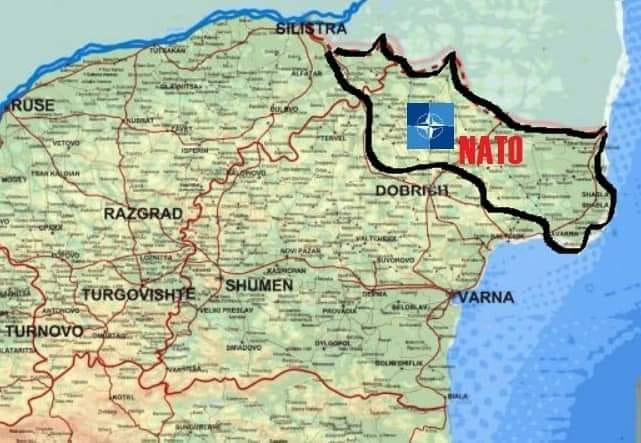
Refugee Week at LEE UNIVERSITY

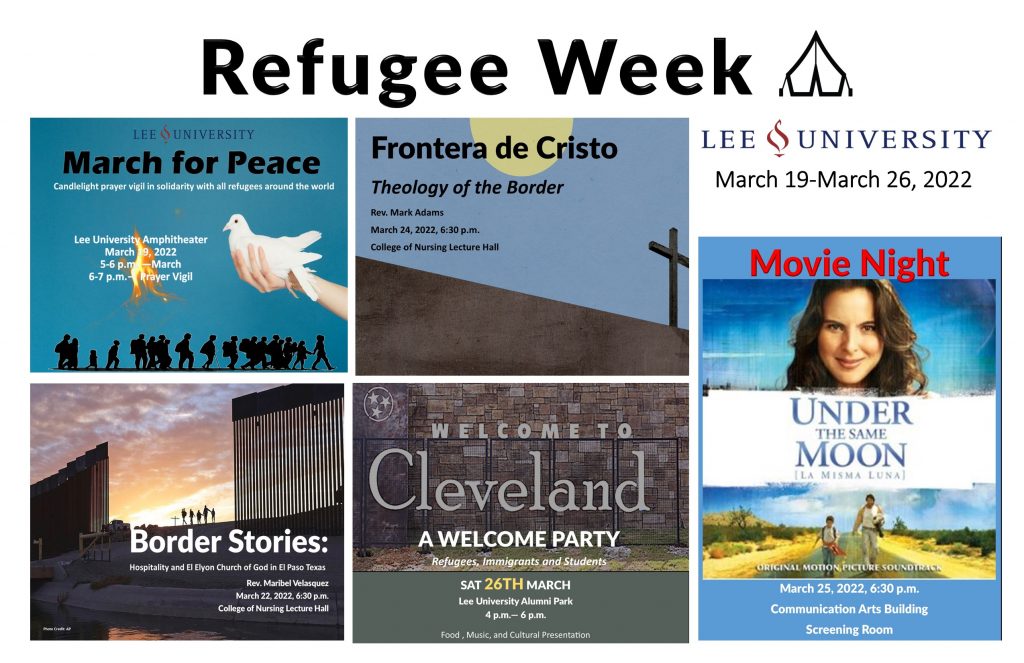
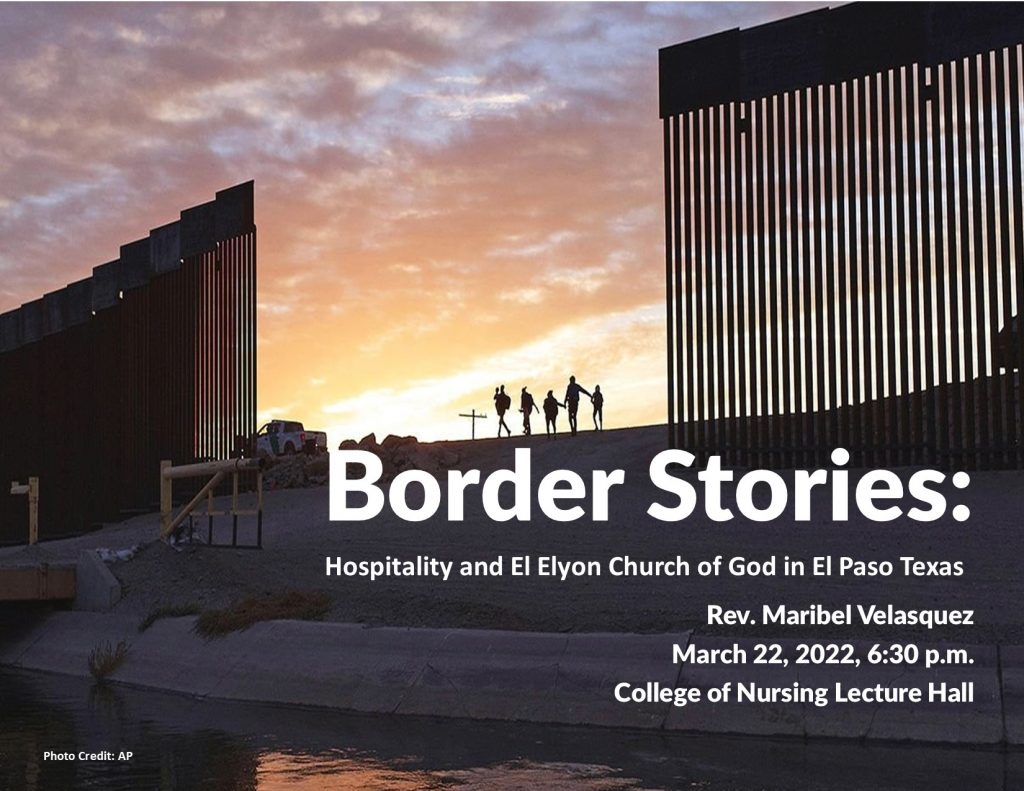
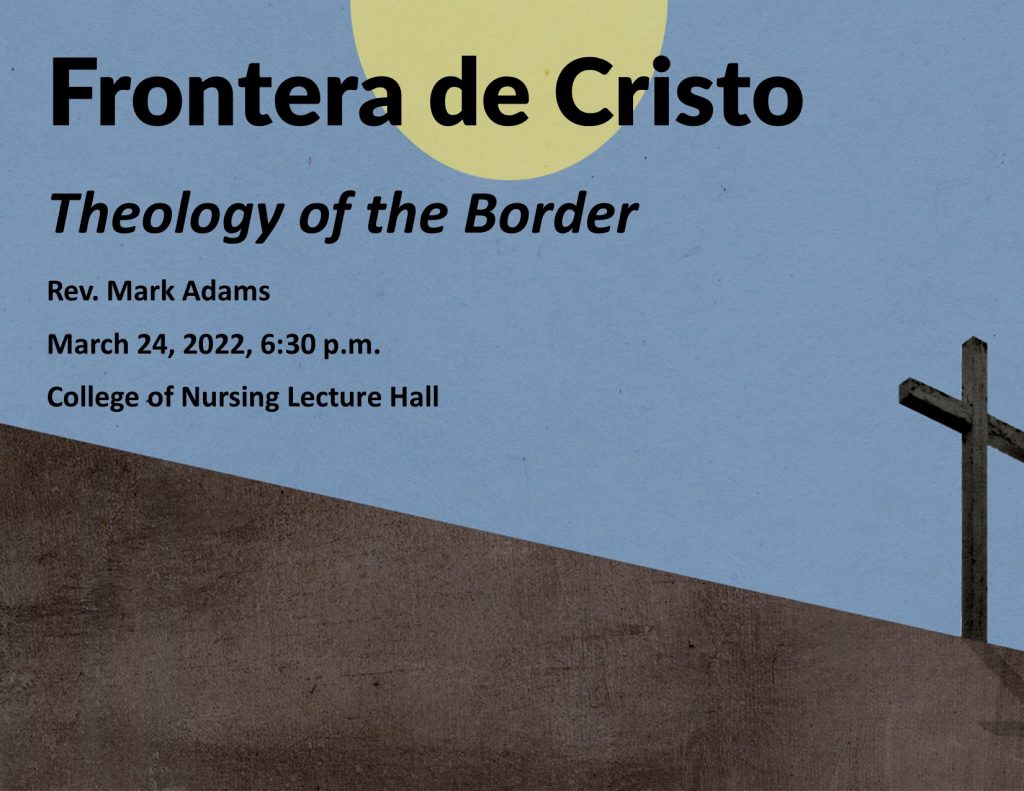

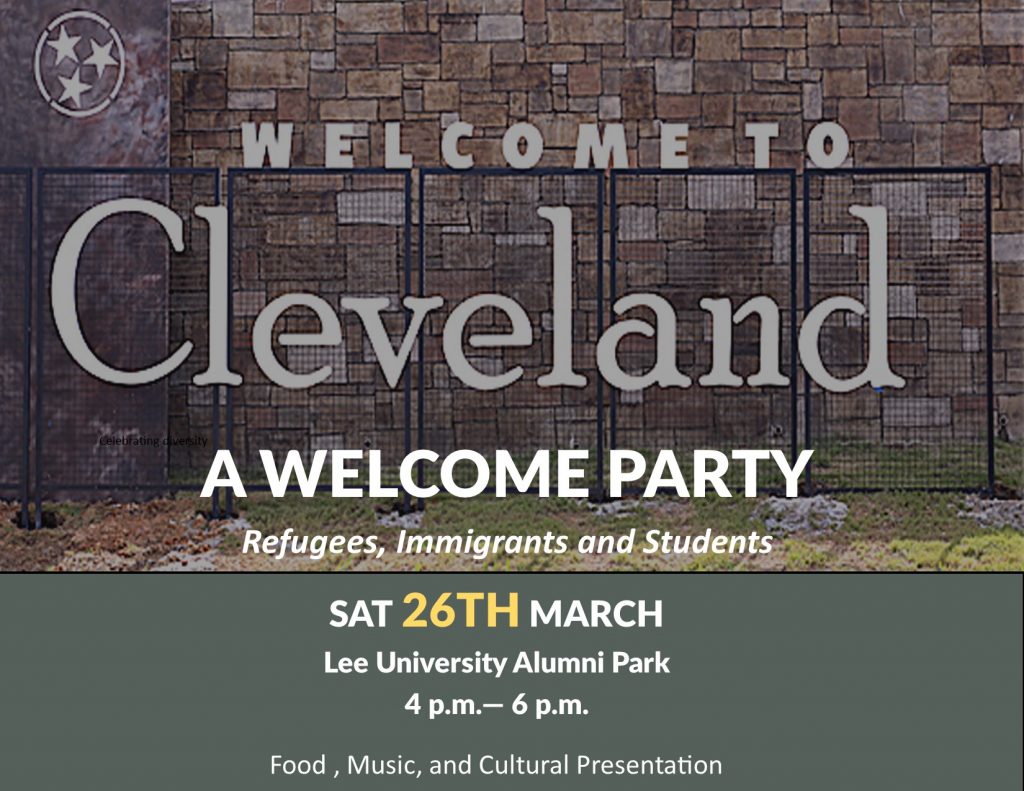
Eastern Pneumotology
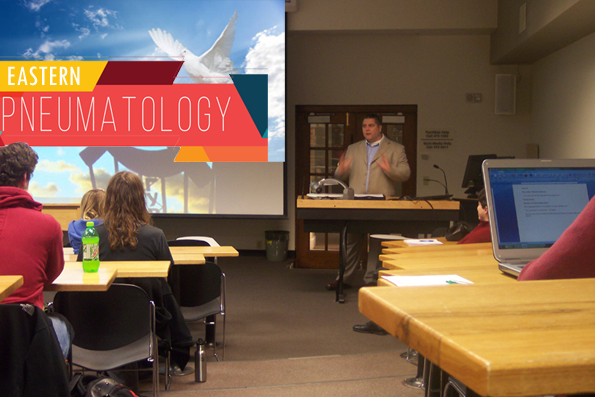
Dony K. Donev, D.Min.:Eastern Pneumotology
Eastern Orthodoxy can be expressed in one word: theism. The purpose and meaning of life is to become more like God. Deification is pursued by all means of human existence. This quest for divine likeness often includes the typical for the Eastern Church, speculation on the divinity and humanity of Christ, traditions on the doctrine of the Trinity and non-traditional mystical experiences. They appear in the context of both physical and spiritual characteristics in individual and corporate ecclesiastical environment. The role of the Spirit in the process of deification is threefold and involves: creation, re-creation and theism.
Eastern Pneumotology follows the graduate process of theism development. The Spirit is involved in the original creation of the world as well as the new-birth experience. His work however, does not end there, but continues throughout the process of personal deification of the believer.[1]
The emphasis of Eastern pneumatological deification is the relationship between the Christian individual and the Holy Spirit as agents of the visible and invisible worlds. This association is reached through a continuing process of deep-devotional prayer, severe fasting and self-denying asceticism, resulting in an enlightening mystical experience, accompanied by the individual’s denial of self and world and faithful dedication to God.
The variety of spiritual experiences in the deification process can be categorized in three main groups. The first category focuses on the “sensory perception” of the Spirit. This includes experiencing the Spirit as vision of bright light, extraordinary feeling of “untold ecstasy” and even a sweet smell.[2] This category includes experiences through a long stretch of time from Pseudo-Macarius (ca. 300–ca. 390) to Symeon the New Theologian (949-1022). The second category argues that the Spirit can be experienced only intellectually in a high level of understanding and knowledge that is not limited by the human mind’s perceptions of reality. This experience is defined and defended by Evagrius Ponticus.[3] Maximus developed the third experiential category, the Confessor (ca. 580-662). It claims that God, as light, can be experienced only in the uttermost darkness where all other created light disappears and only God’s light remains true.[4]
Prayer is a central and essential part of the above experiences. Without prayer one is not prepared to experience the Spirit, neither is he ready to understand and recognize the power and existence of the divine. Gregory Palamas (XIV c.) further claims that such understanding and recognition leads to an experience, which “transfigures the whole human body after the pattern of Christ’s own transfiguration.”[5] Supernatural miracles, spiritual gifts, knowledge and wisdom are often the reflection of such an experience in one’s life. Such an experience of deep emotional state in a mystical context evolves into a total dependence on divine direction, as a replica of Christ’s obedience.
[1] Gregory of Nyssa, Commentary on Canticles, in Herbert Musurillo trans., From Glory to Glory: Texts from Gregory of Nyssa’s Mystical Writings (New York: Charles Scribner’s Sons, 1961), 190.
[2] John Cassian, Collationes 4.5, PL 49:col. 589.
[3] Alphonsi Mangana, Woodbrooke Studies 7, Early Christian Mystics (Cambridge: W. Huffer and Sons, 1934), 71.
[4] Stanley M. Burgess, The Holy Spirit: Eastern Christian Tradition (Peabody: Hendrickson Publishers Inc., 1989), 4.
[5] Burgess, 5.
Head NATO Commander visiting Bulgaria
The commander of Nato’s Allied Land Command, Lieutenant General Roger Cloutier, is visiting Bulgaria, according to a Bulgarian Defense Ministry statement on March 2.
Cloutier has held talks with Bulgaria’s Defence Chief, Admiral Emil Eftimov, on measures to strengthen Nato’s deterrent and defense capabilities in Eastern Europe as a result of hostilities in Ukraine, the Defence Ministry said.
Bulgaria’s decision to build an Alliance battle group was welcomed, and the possibilities for other nations to participate in it in order to increase the training and interoperability of the allies were discussed, the statement said.
The timeliness of the decision was emphasized, which is in line with the establishment of battle groups in other Eastern European countries. On March 2, Cloutier was to visit Bulgarian military formations and training grounds, where he would get acquainted with the state of their capabilities and the opportunities for joint training and exercises, the ministry said.

 Bulgarian Chaplaincy Association celebrates 25 years of Military Ministry in Bulgaria since the first event co-hosted by the Bulgarian Armed Forces and government officials in 1997.
Bulgarian Chaplaincy Association celebrates 25 years of Military Ministry in Bulgaria since the first event co-hosted by the Bulgarian Armed Forces and government officials in 1997.
2018 The Road toward a Balkan Multi-Ministry Center and Legal Status
2017 Bulgarian Chaplaincy Association: Legal Case Renewed
2015 Revisting the Integration Proposal with Local NATO Programs by Bulgarian Chaplaincy Association
2014 Bulgarian Chaplaincy Association: Vision and Resolution Reaffirmed
2012 First Class of the Master’s of Chaplaincy Ministry Program
2011 Master’s of Chaplaincy Ministry Program Continues
2010 Master’s of Chaplaincy Ministry Program begins in Sofia, Bulgaria
2009 Bulgarian Chaplaincy Association holds an introductory chaplaincy course in Yambol, Bulgaria
2008 The Case of a NATO Chaplaincy Model within the Bulgarian Army released
2007 Bulgarian Chaplaincy Associations Recognized by U.S. Department of State
2006 Registration for the Bulgarian Chaplaincy Association Rejected by Bulgarian Court
2005 The Bulgarian Chaplaincy Association presented before the Bulgarian Evangelical Alliance
2004 Three U.S. Bases in Bulgaria to be Built by 2010
2003 The Case of a NATO Chaplaincy Model within the Bulgarian Army
2002 First Balkan Chaplaincy Conference at the Central Church of God in Sofia, Bulgaria
2001 Church of God Chaplaincy Commission to visit Bulgaria
2000 Euro-seminar: Christian ethics in the military forces
1997 First Military Ministry Seminar in Veliko Tarnovo
With all this accomplished, in the beginning of the 21st century law and chaplaincy meet on the road to democracy as Bulgaria remains the only country in NATO without military force chaplaincy. But before chaplaincy could be legalized completely and endorsed by the state to its full functionality, several changes must be undergone. Some of them are:
- Legal provision allowing chaplains to work as staff in the army, which guarantees the equal presence of protestant chaplains as well.
- The approval, acceptance and implementation of a NATO based model for chaplaincy within the structures of the Bulgarian Army.
- Periodical and systematic educational strategy toward chaplaincy workers among Bulgarian evangelicals.
- A paradigm for cooperation of Bulgarian chaplains from various ethnic, religious and cultural backgrounds.
- Further research publications to enhance the efficiency of chaplaincy within the Bulgarian national context.
Also important [click to read]:
- U.S. Department of State recognizes our chaplaincy efforts in Bulgaria
- Bulgarian Chaplaincy Association: Integration Proposal with Local NATO Programs
- Bulgarian Chaplaincy Association: Vision and Resolution
- Chronology of our role and involvement in developing Church of God chaplaincy in Bulgaria since 2001
- Master’s of Chaplaincy Ministry Program in Bulgaria Reflections
- The Past Decade of Chaplaincy in Bulgaria (2006-2016)
- Related Publications and Presentations by Cup & Cross Ministries International
More Publications on the Topic and History of Events:
-
- Chaplaincy Conference and Master’s of Chaplaincy
- Chaplaincy Course in Yambol, BULGARIA
- Bulgarian Chaplaincy Association Annual Meeting
- Family Seminar for Military Men and Women
- Cup & Cross Ministries in Church of God Publications
- The Case of a NATO Chaplaincy Model within the Bulgarian Army
- 10 Years of Military Ministry in Bulgaria
- National Chaplaincy Conference
- Bulgarian Chaplaincy Association Gains Legal Status
- Chaplain Dees Visits Bulgaria
- Chaplaincy Course at the Bulgarian Evangelical Theological Institute
- Bulgarian Chaplaincy Association
- Meeting the NATO Chaplain
- National Chaplaincy Meeting
- Chaplaincy Developments in Bulgaria
- U.S. Bases in Bulgaria
- National Chaplaincy Meeting
- Chaplaincy in Bulgaria
- HEALTHCARE CHAPLAINCY IN BULGARIA
- Chaplaincy in Bulgaria
- Mission Bulgaria
Pandemic, Green Certificate and War Scares

While most Western Europe is now slowly abandoning the idea of a vaccination Green Certificate for travels, Bulgaria is still firmly using such as a permanent requirement. The improvements from the European Union seem to matter little in our Balkan reality, and our churches here have been forced to deal with this since the Pandemic hit.
As if this is not enough, the war in Ukraine is just too close to ignore. Seems like Bulgaria is now pressed between Ukraine and Macedonia in the European Union, and between Russia and NATO in a more global context and this will continue for the foreseeable future.
We have been praying and fasting in the months past that God’s mercy is upon the people and the ministry. Now, that most of denominational ordeals here seem to have come to a sad end, please continue to remember the people of Bulgaria, our decades long commitment to the work of the Great Commission and the many souls that still need salvation, discipleship and ministry on the Balkans.
PRAY for #UKRAINE
They are bringing the bodies out of my hotel pic.twitter.com/hjDHjOlQIM
— Daniel Sandford (@BBCDanielS) February 20, 2014
Live Updates: Crisis in Ukraine
FOX News: EU reportedly agrees to impose sanctions on Ukraine as truce falls apart
Reuters: After Ukraine’s bloodiest day, EU tries to broker peace
BBC: Ukraine unrest: EU sanctions imposed
FOX News: Following whipping, anti-Putin punk band posts new video criticizing Sochi Games
CNN: Truce ends, death toll rises in Ukraine
BBC: Why is Ukraine in turmoil?
PUBLICATIONS and NOTABLE MENTIONS
European Legal Cultures in Transition By Grødeland, Åse B. Miller, William Lockley (p. 522)
European Pentecostalism by William Kay; Anne Dyer. Series: Global Pentecostal and Charismatic Studies (p. 242-43)
Global Temperance and the Balkans: American Missionaries, Swiss Scientists and Bulgarian Socialists, 1870–1940 By Nikolay Kamenov.
Brother Doni[y] Donev always found time to respite from his theological studies in order to instruct me in the factual history of the Protestantism in BULGARIA…
Dave Emmett in his W.F.P. Burton (1886-1971): A Pentecostal Pioneer’s Missional Vision for Congo, 2020 (p. 84 and 315) on Pentecostal Primitivism
Journal of European Baptist Studies: Historiography of Baptists in Russia
Authors: Wardin, Albert of the Baptist Convention’s Historical Library and Archives
“With the help of an American Pentecostal of Bulgarian descent, Dony Donev, and the archives of the Assembly of God in the USA, I have assembled an extensive collection of material on the Voronaev movement.”
Charismatic Reformer, Mystic or Father? The Reception of Symeon the New Theologian by Pentecostal/Charismatic Theologians.
by Lysack, Maxym Faculty of Theology, Saint Paul University
Source: Religions; Jun 2021, Vol. 12 Issue 6, p389
In People of the Spirit : The Assemblies of God By McGee, Gary B.
Ed.: Revised and updated. Springfield, Missouri : Gospel Publishing House. 2014
In Religion and Politics in Post-Socialist Central and Southeastern Europe
Challenges Since 1989 on behalf of the East-West Church and Ministry Report
ALSO Church, State, and Democracy in Expanding Europe
By Lavinia Stan, Lucian Turcescu · 2011-2021
The Politics of Language and Nationalism in Modern Central Europe
By T. Kamusella · 2008
Religion and Politics in Post-Socialist Central and … – Page 284 Sabrina P. Ramet · 2014 ·
im Sinne des bulgarischen Church of God Theologen Dony K. Donev der darin die Bedingung für das (er-)leben ..
Geisterfahrer zwischen Transzendenz und Immanenz – Page 54 Giovanni Maltese · 2013
Church of God Evangel vol. 84 1994
Historical Theology in Brill’s Encyclopedia of Global Pentecostalism
• Voronaev, Ivan Efimovich
• Zaplishny, Dionissy Michailovitch
• Nikolov, Nicholas
• Anna Ladd Bartleman
Recent Biblical Studies for the Pneuma Foundation
• Mission of God Study Bible
• Maxwell Leadership Bible
• Fire Bible
• Spirit Filled Life Bible
• Strange Fire?

When leaders fail to lead themselves
A leader who lacks character or integrity will not endure the test of time. It doesn’t matter how intelligent, affable, persuasive, or savvy a person is, if they are prone to rationalizing unethical behavior based upon current or future needs, they will eventually fall prey to their own undoing. Optics over ethics is not a formula for success.
Cup & Cross Ministries Offers Ministry Leadership Table
Empowered by the vision for a continuous revival within the church of the 21st century, we have chosen to make the mission of our work this one statement: We help churches grow.
One of the approaches we have taken to accomplish this ministry goal is Consulting and Coaching:
- We have successfully worked with over 50 churches toward their effective missions programs and growth through (1) leadership training and team building seminars, (2) in-depth case study of church and ministry evaluations and (3) implementing individually designed strategies for ministry development
- Currently, our team provides continuous education to over 200 church leaders and ministry teams around the world through teaching and lecturing on a weekly basis along with daily prayer support
- We extend our efforts toward church growth by helping build strong family connections through relations counseling and parenting classes implementing play therapy as Board Certified LPC
Beside personal presence and team building strategies, we implement the media in virtually every approach of ministry. We have published several research monographs as well as film series about our ministry work. Our team holds a weekly TV program called the Bible Hour. (Learn how we help churches build their own and unique web presence)
Areas of Ministry:
|
Daily Ministry Reach:
|


![s_k01_70616745[1]](https://cupandcross.com/wp-content/uploads/2014/02/s_k01_706167451.jpg)





